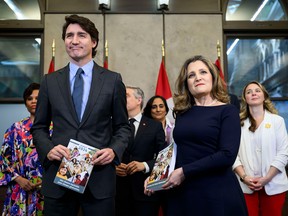The budget contained several measures that won’t make big headlines
Article content
OTTAWA – Finance Minister Chrystia Freeland unveiled a budget with new taxes on wealthy Canadians, a bundle of new spending initiatives, and lots of red ink on Tuesday, but also contained several measures that won’t make big headlines.
The government wants to help Canadians get Taylor Swift concert tickets, disconnect from their jobs and cancel their cellphones online, among others. Here are some key policies and under-the-radar spending items in this year’s budget.
Advertisement 2
Article content
Article content
The right to disconnect
Up to half a million workers in federally regulated sectors like banking, telecommunications and the transportation industry may soon have a right to disconnect from work after hours.
The latest budget commits to invest $700,000 per year for five years to amend the federal Labour Code that would require federally regulated employers to implement a right to disconnect policy that limits all work-related communication outside of an employee’s regular working hours.
“As the nature of work in many industries has become increasingly digital, workers are finding it increasingly difficult to disconnect from their devices and inboxes after hours and on weekends,” the budget reads.
Taylor Swift tickets for all (except resellers)
A budget geared towards Gen Z and Millennials wouldn’t be complete without a reference to Taylor Swift. So, when thousands, if not millions, of Canadians failed to secure tickets to the pop megastar’s Eras Tour stops in Toronto and Vancouver, the Liberals decided they had to act.
In the budget, the government promises to work with provinces to crack down on “fraudulent resellers” who “maliciously” snatch up desirable tickets and boost prices using bots and other unfair techniques.
Article content
Advertisement 3
Article content
It will also work towards unspecified “stronger protections” against excess ticketing fees and ensuring people get timely refunds for cancelled events.
But the credibility of these government commitments is cast into doubt when the budget cited the hypothetical example of Toronto Maple Leafs fan “Nick” struggling to get a refund for unnecessary playoff game tickets because the Leafs swept through the first round of the playoffs in four matches.
One government source told National Post that the original example had the Leafs losing in four, but the blurb was edited in the days before the budget. Presumably to avoid any further municipal-federal confrontation.
Capitalizing on capital gains
If you’re anything like the author of these lines, capital gains are just an abstract notion that has little to no bearing on your annual income.
But for 40,000 wealthy Canadians (0.13 per cent of the population), they represent over $250,000 of income yearly and the government says they are undertaxed.
As of now, half of all capital gains (which come from the sale of assets like stocks or a second home) are exempt from taxes. The Liberals say that’s not fair because the wealthier you are, the more your income is made up of capital gains. So, they’re proposing to reduce the tax-exempt amount to one-third for capital gains that exceed $250,000 in a year.
Advertisement 4
Article content
The lower exemption would also apply to businesses but for all capital gains, not just those over $250,000 in a year.
The additional capital gains taxes are expected to rake $19.4 billion into the government’s coffers over the next five years.
Halal mortgages
The number of Muslims in Canada is rising yearly, meaning so is interest for “halal mortgages” which trade interest payments (which are not allowed under Islamic law) for “profit rate.”
In March, the government launched consultations with financial institutions and ethnic communities on how federal policies could be better adapted to their needs. One key finding was expanding access to “alternative financing products” like halal mortgages.
“This could include changes in the tax treatment of these products or a new regulatory sandbox for financial service providers, while ensuring adequate consumer protections are in place,” reads the budget, which promises more details in the 2024 Fall Economic Statement.
CRA fighting the people who don’t want to give up documents
The Canada Revenue Agency (CRA) is tired of fighting for suspected tax dodgers’ documents.
Advertisement 5
Article content
“Limits to existing information gathering powers provided to the CRA under the Income Tax Act impede the effectiveness of the CRA’s compliance and enforcement actions,” the government admits in the budget.
A key solution highlighted in the budget is a new tool called a “Notice of Non-Compliance” that the CRA could issue if a taxpayer being audited or verified has not provided information required by the agency.
The notice recipient would then be fined $50 each day they do not provide the required information to a maximum of $25,000. The notice would be reviewable by both the CRA and the Federal Court at the request of the taxpayer.
If the taxpayer who is suspected of owing over $50,000 in unpaid taxes in a year continues to refuse to comply with a CRA request, the budget also promises to impose a 10 per cent penalty if the government successfully goes through the costly process of getting a compliance order from a judge.
“The proposed penalty… would create an incentive for taxpayers to comply with the original request for information or assistance,” reads the budget.
Advertisement 6
Article content
Cancel your cellphone plan online
Annoyed by the constant barrage of hoops and retention offers cellphone companies throw at you after forcing you to call them to cancel your service? So is the government apparently.
The budget promises to amend the Telecommunications Act to compel cellphone carriers to provide “self-service” options like an online portal to allow customers to change or end their plans with their provider.
The changes will also bar cellphone companies from charging customers a fee to switch to another carrier and they will also have to inform their clients of other plans when their contract is coming to term.
Get more deep-dive National Post political coverage and analysis in your inbox with the Political Hack newsletter, where Ottawa bureau chief Stuart Thomson and political analyst Tasha Kheiriddin get at what’s really going on behind the scenes on Parliament Hill every Wednesday and Friday, exclusively for subscribers. Sign up here.
Our website is the place for the latest breaking news, exclusive scoops, longreads and provocative commentary. Please bookmark nationalpost.com and sign up for our politics newsletter, First Reading, here.
Article content






